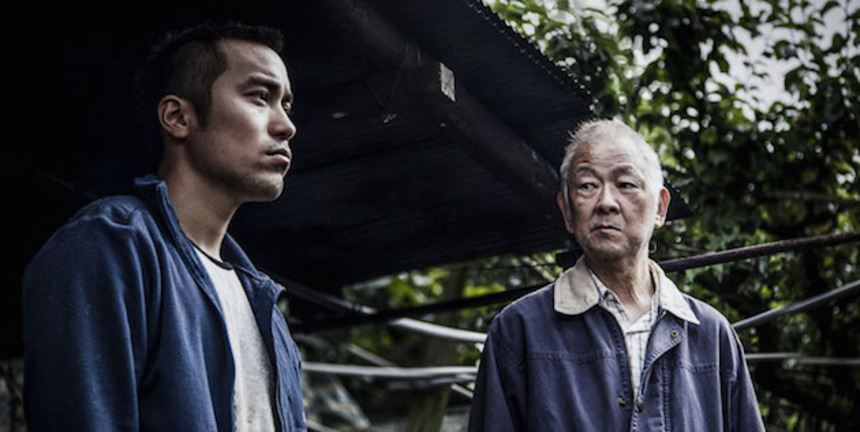Five Flavours 2014 Review: Psychological Chiller SOUL Centers On A Complicated Father-Son Relationship

Mong-Hong Chung's third full-length feature is a lusciously crafted, nightmarish piece of moody cinematic poetry that ruminates on the essence of existence and the human soul. Beyond being a profoundly mysterious and disquietingly eerie supernatural chiller, Soul centers on a strained relationship between a father and a son, building most of its penetrating horror around escalating psychological tension.
With its gorgeously atmospheric and dizzy camera work (by Chung, who works under the pseudonym Nakashima Nagao), razor-sharp editing, and piercing sound effects, Soul proves to be a strangely mesmerizing thriller that occasionally attempts to confound the audience with its perceptive cinematic metadiscourse. Unfortunately, given that it relies heavily on an ambiguous narrative structure and obscure symbolism, Soul unintentionally reduces its possibility to attract those viewers who aren't familiar with Chung's muddling metaphor-filled body of work.
Although the film opens in an undisclosed Taipei-based Japanese restaurant, it takes Chung less than five minutes to shift the mis-en-scene from one location to another and set the mood for what's to come. After A-chuan (Joseph Chang), close-mouthed chef working at the aforementioned joint, collapses while gutting a fish and is then diagnosed with possible depression his co-workers take him to his family house in Taichung, a rural Taiwanese village situated in what looks like a fairy-tale nightmare forest, a place in which Chang finds his own personal cabin in the woods.
In this claustrophobic, uncanny place A-chuan is being taken care of by his aging father Wang (veteran Chinese actor Yu Wong) and attentive sister Yun (2014 Golden Horse Award winner Chen Shiang-chyi). But before A-chuan's relatives fully comprehended that what's really happening here might have more otherworldly implications than the serious yet treatable illness, a grisly murder takes place, turning Wang's world upside down. Or so it seems. Indeed, when blood is involved, nothing is simple.
Not nearly as shocked as he should be after seeing his daughter's dead body lying on the floor, Wang tries to determine what lead A-chuan to commit a crime. 'I saw this body was empty, so I settled in' utters the latter calmly, clearly hinting at demonic possession. The position of the characters (son sitting on a bed while his father stands before him), the emotionless look on the father's face, his alarmingly calm behavior, and the suggestive camera angle (from behind Wang's shoulder, focusing on A-chuan's face) - with the help of all those elements Chung consciously reduces a significant amount of tension from this particular scene and turns potentially violent dispute into an outlandish but visibly tranquil conversation, as if trying to ignore the fact that the blood on the ground is still fresh. Soon, however, an unexpected visit from an old policeman-friend Wu (Liang He-chun as the film's only 'positive' character) disrupts this bizarrely moving father-son bonding moment and effectively triggers a surreal, macabre chain of events.
Wang not only risks losing his comforts when he decides to protect his son from himself and from the influence of the outside world, but also willingly exposes the darker side of his own personality. Thanks to Wong's unobtrusive yet quietly sinister performance, it becomes apparent that the father is, in fact, the most layered character in the picture. Though A-chuan's unexplainable soul-change propels the narrative, it's inevitably the old man who emerges as the central character of the story. Wang's actions and words only confirm that his unpredictable nature might ultimately be more harmful to everyone around than his son's enigmatic mental disorder.
With Soul rising Taiwanese helmer Chung once again proves his position as one of the most promising figures of the Taiwanese new wave. Though his films are still not as far-reaching and meaningful as Tsai Ming-liang's (perhaps the country's most widely celebrated director nowadays), Chung deserves to be praised for his bold and intelligent approach to a topic that on paper seems rather threadbare and the breathtaking visual style that puts many western genre filmmakers' work to shame.
Although the film never reveals what's really happened to A-chuan and thus doesn't satisfy the strong urge to know more, it's the omnipresent sense of danger lurking just beyond the camera's reach that makes
Soul so atmospheric and gripping. Consider, for example, the brilliant tracking shot that follows a local detective slowly and hesitantly approaching A-chuan's hideout. It's quite obvious that something bad is going to happen, but the way Chung handles the scene until its gruesomely grotesque climax makes one's hair stand on end.
Soul
Director(s)
- Mong-Hong Chung
Writer(s)
- Mong-Hong Chung
Cast
- Yu Wang
- Hsiao-chuan Chang
- Shiang-chyi Chen
- Shih-Chieh Chin

Do you feel this content is inappropriate or infringes upon your rights? Click here to report it, or see our DMCA policy.






